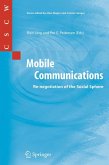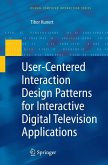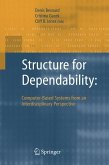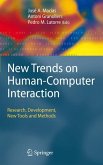Ubiquitous environments are important because they allow users to move about freely and continue the interaction with the available applications through a variety of interactive devices (including cell phones, PDA's, desktop computers, digital television sets, and intelligent watches). A frustrating limitation is that people have to start their session over again from the beginning at each interaction device change. This book reports results based on the work in the OPEN project. It provides solutions able to address three key aspects: device change, state persistence and content adaptation. There is a lack of migratory services technology for the migration of applications in different usage scenarios. This book offers a general and open migratory service platform solution based on a sound and innovative scientific approach developed by a multi-disciplinary consortium combining the expertise of three technological world leaders, three well-known research organizations and one SME.
Dieser Download kann aus rechtlichen Gründen nur mit Rechnungsadresse in A, B, BG, CY, CZ, D, DK, EW, E, FIN, F, GR, HR, H, IRL, I, LT, L, LR, M, NL, PL, P, R, S, SLO, SK ausgeliefert werden.









